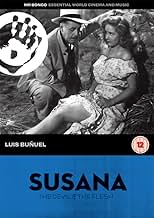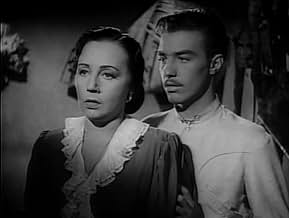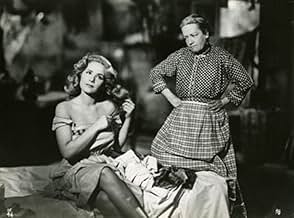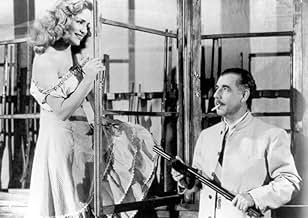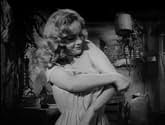VALUTAZIONE IMDb
7,2/10
2393
LA TUA VALUTAZIONE
Una giovane donna fugge dal riformatorio e rimane nella casa di una famiglia ricca e rispettabile. A poco a poco, provoca discordie tra i membri della famiglia fino a quando non torna in car... Leggi tuttoUna giovane donna fugge dal riformatorio e rimane nella casa di una famiglia ricca e rispettabile. A poco a poco, provoca discordie tra i membri della famiglia fino a quando non torna in carcere.Una giovane donna fugge dal riformatorio e rimane nella casa di una famiglia ricca e rispettabile. A poco a poco, provoca discordie tra i membri della famiglia fino a quando non torna in carcere.
- Regia
- Sceneggiatura
- Star
- Premi
- 1 candidatura in totale
Jesús García
- Empleado de Guadalupe
- (non citato nei titoli originali)
Leonor Gómez
- Empleada de Guadalupe
- (non citato nei titoli originali)
Recensioni in evidenza
This Bunuel film is based on a story written by a certain Manuel Reachi (who incidentally, like the director Bunuel, was born in Spain and died in Mexico). The film indirectly (and in some ways directly) glorifies the pious Christian faithful--here personified by the lady of the house and her chief maid who can spot "the devil" before the others do and is ready to drive it out as Jesus did in the Bible. This is a definite departure for Bunuel, who has never really shown a true Christian point of view in his films (except in Nazarin) but only chose to ridicule often than respect it.
The film is also a major departure for actor Fernando Soler playing the role of the rich landowner who gives a tepid performance compared to the one he gave in the other Bunuel film "The Great Madcap" (1949) made 2 years before this film.
The film is also a major departure for actor Fernando Soler playing the role of the rich landowner who gives a tepid performance compared to the one he gave in the other Bunuel film "The Great Madcap" (1949) made 2 years before this film.
For years I have had a poster for this film on my wall but not until now have I ever seen it. It may have been included in a season at the National Film Theatre many years ago when I know I saw, Ascent to Heaven, but not this one. Even on my poster, Rosita Quintana looks alluring, but not quite as alluring as she is in this, simple yet effective, little known melodrama. The camera-work is marvellous with all manner of angles and shades of black and despite the predictability of the disruption this 'fallen woman' will precipitate, there are plenty of Bunuelian touches. I agree with others that the happy ending is probably nothing of the sort. Even Mexicans don't shrug off a passionate intrusion into their life that easily. The family is surely doomed as soon as the father takes a shine to the delicious snake in their midst.
"Susana" lacks the usual touches of irony and surrealism present in other Buñuel films. Buñuel tells a straightforward story - the sort of melodrama that dominated the Mexican movie theaters at the time.
Susana escapes from the reformatory in which she was locked. It's a dark and stormy night. Meanwhile in a ranch nearby the members of a peaceful family follow their occupations. An old servant maid is mumbling that in nights like this the devil walks around. Thunder and lightning. Susana's face appears in the window. She faints. She is brought inside the house. Susana is a young girl with a wayward sensuality (remember, we are in 1951). Her presence will bring discord and threaten the stability of the family.
Buñuel, even in his most surrealistic films, was always deeply anchored in the reality. That is why his films are so strong. His films have a taste of earth, humanity, sensuality. "Susana" is in fact a very sensual film. The camera subtly follows Susana, her chaotic sensuality, and the other characters' reactions to her. She's the main character but not much is told about her. She was locked in a reformatory. Why? We are not told. The world doesn't accept her and her ways. Does she know what she really wants? Unfortunately it was not possible for Buñuel to give us a deeper portrait of Susana. We see her mostly through the eyes of the outside world. Why is Susana like that? What happened to Susana?
"Susana" is an over-the-top melodrama - seemingly innocent, but in the "happy ending", that seems to come out of a fairy tale, some people may detect a hidden laughter. The film was a big success in Mexico and contributed to establish definitely Buñuel as a commercially viable director.
Rosita Quintana as Susana proves her wide acting range (a shy governess in "La Ausente" and a sensual temptress in "Susana"). She's beautiful and in "Susana", she's a real volcano. Fernando Soler also distinguishes himself as the pater familias (he was also the moralist judge in "Sensualidad" and the dissolute drinking father in "Oveja Negra").
Actors and scenery are harmoniously integrated in "Susana" and Buñuel is (as always) a master of images and very adept in creating mood. Highly recommended!
Susana escapes from the reformatory in which she was locked. It's a dark and stormy night. Meanwhile in a ranch nearby the members of a peaceful family follow their occupations. An old servant maid is mumbling that in nights like this the devil walks around. Thunder and lightning. Susana's face appears in the window. She faints. She is brought inside the house. Susana is a young girl with a wayward sensuality (remember, we are in 1951). Her presence will bring discord and threaten the stability of the family.
Buñuel, even in his most surrealistic films, was always deeply anchored in the reality. That is why his films are so strong. His films have a taste of earth, humanity, sensuality. "Susana" is in fact a very sensual film. The camera subtly follows Susana, her chaotic sensuality, and the other characters' reactions to her. She's the main character but not much is told about her. She was locked in a reformatory. Why? We are not told. The world doesn't accept her and her ways. Does she know what she really wants? Unfortunately it was not possible for Buñuel to give us a deeper portrait of Susana. We see her mostly through the eyes of the outside world. Why is Susana like that? What happened to Susana?
"Susana" is an over-the-top melodrama - seemingly innocent, but in the "happy ending", that seems to come out of a fairy tale, some people may detect a hidden laughter. The film was a big success in Mexico and contributed to establish definitely Buñuel as a commercially viable director.
Rosita Quintana as Susana proves her wide acting range (a shy governess in "La Ausente" and a sensual temptress in "Susana"). She's beautiful and in "Susana", she's a real volcano. Fernando Soler also distinguishes himself as the pater familias (he was also the moralist judge in "Sensualidad" and the dissolute drinking father in "Oveja Negra").
Actors and scenery are harmoniously integrated in "Susana" and Buñuel is (as always) a master of images and very adept in creating mood. Highly recommended!
Buñuel's fifth feature, a small-budgeted moral parable made in Mexico, almost exclusively confined in the hacienda of a middle-class rancher owner Don Guadalupe (Soler). In an unusual tempest night, a sultry young woman Susana (Quintana) escapes from a reformatory and winds up at his doorstep, she is taken in by the kind-hearted matriarch Doña Carmen (Palou), Guadalupe's wife, as a domestic help. But soon the seemingly perfect family will disintegrate from inside when Don Guadalupe, his adolescent son Alberto (Somoza) and the masculine ranch helper Jesús (Mendoza) are all attracted to Susana's sex appeal, only the God-fearing maid Felisa (Arcos) sees through her innocuous front, but who can save the family from the ultimate rupture in the climax? Only Buñuel's deus ex machina.
In fact, the movie itself is grounded on a surreal precondition, in the opening scenes, Susana is locked up in a solitary cell, she entreats God in front of a cross materialised by the shadows of the metal bars, to give her a way out since she can not change her nature, which is made by God himself, so God grants her wish, as if he wants to cast a prank on us, releases the snake into the Garden of Eden. The script runs formulaic-ally where three different types of men all become the victims of Susana's seduction, Rosita Quintana successful captures her carnal allure with crude histrionics, for the spunky Jesús, she is the unattainable wench who promises him something sweet but refuses his pushing courtship; for the bookish Alberto, she is a proactive seductress from whom he is too green to resist, and for the patrician Guadalupe, she becomes a damsel in distress, who inadvertently rekindles his sexual urge which a married middle-age man can no longer obtain from his wife. While men are succumbing to their primitive lust, after seeing through her veiled pretence, Carmen and Felisa strike up, only that would be too late if Buñuel had opted for a more sinister finale.
The happy ending is a policy of appeasement, even the mare miraculously regains its vitality, but the re-gained conformity and harmony appear so ironic thanks to Buñuel's poker-faced mockery - how simple a weed in the field can bring about moral corruption to a conventional middle-class family. SUSANA is a fetching microcosm of Buñuel's views on human frailties, unambitious, simple but integral and surprisingly gratifying.
In fact, the movie itself is grounded on a surreal precondition, in the opening scenes, Susana is locked up in a solitary cell, she entreats God in front of a cross materialised by the shadows of the metal bars, to give her a way out since she can not change her nature, which is made by God himself, so God grants her wish, as if he wants to cast a prank on us, releases the snake into the Garden of Eden. The script runs formulaic-ally where three different types of men all become the victims of Susana's seduction, Rosita Quintana successful captures her carnal allure with crude histrionics, for the spunky Jesús, she is the unattainable wench who promises him something sweet but refuses his pushing courtship; for the bookish Alberto, she is a proactive seductress from whom he is too green to resist, and for the patrician Guadalupe, she becomes a damsel in distress, who inadvertently rekindles his sexual urge which a married middle-age man can no longer obtain from his wife. While men are succumbing to their primitive lust, after seeing through her veiled pretence, Carmen and Felisa strike up, only that would be too late if Buñuel had opted for a more sinister finale.
The happy ending is a policy of appeasement, even the mare miraculously regains its vitality, but the re-gained conformity and harmony appear so ironic thanks to Buñuel's poker-faced mockery - how simple a weed in the field can bring about moral corruption to a conventional middle-class family. SUSANA is a fetching microcosm of Buñuel's views on human frailties, unambitious, simple but integral and surprisingly gratifying.
This film, judging by some of the reviews on this page, seems to have a provocative effect: one person seems to feel that Susana is evil incarnate and should have been killed. Perhaps that's the point: Bunuel may very well have meant her to be a caricature of the "bad girl." While she uses her sexuality as a weapon, she is merely provoking desires that were always there. The family she inserts herself into is an apparently happy one, and perhaps itself a stereotype, with feelings under the surface waiting to escape, just as Susana herself is an escapee. Her seduction technique is itself pointedly obvious, and Bunuel may very well have been telling something of a joke with this film, neither his best nor worst. And the actress who plays Susana does have nice shoulders.
Lo sapevi?
I più visti
Accedi per valutare e creare un elenco di titoli salvati per ottenere consigli personalizzati
- How long is Susana?Powered by Alexa
Dettagli
- Data di uscita
- Paese di origine
- Sito ufficiale
- Lingua
- Celebre anche come
- Susana
- Luoghi delle riprese
- Aziende produttrici
- Vedi altri crediti dell’azienda su IMDbPro
- Tempo di esecuzione1 ora 26 minuti
- Colore
- Proporzioni
- 1.37 : 1
Contribuisci a questa pagina
Suggerisci una modifica o aggiungi i contenuti mancanti

